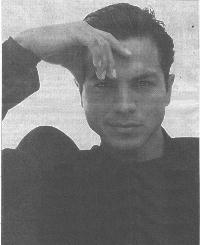 Benjamin
Bratt has no shame.
Benjamin
Bratt has no shame.
The New York-based actor, who appears on the NBC crime-drama "Law & Order," tried handing out fliers, to no avail, to hype an independent film he recently completed. Now Bratt pull out all the stops.
"I’ve gotten to the point where I walk right up to somebody and say, ‘Hey, do you know me from ‘Law & Order’? Let me tell you about this film my brother and I produced called ‘Follow Me Home,’" Bratt says. The film tells the story of four artists on a road trip to the White House to paint a mural on the building.
"By and large, that works. Their immediate impression of me must be, ‘This guy must be desperate.’ But it’s not desperation at all; it’s unabashed enthusiasm and pride in what this project is and what it has to say."
Ethnic pride started early for the 33-year-old San Francisco native, whose mother is Peruvian and father is German-English. In 1970, Bratt’s mom was part of an American Indian Movement political protest, which took over the unoccupied island of Alcatraz. For a year, Bratt, his four siblings and their mom spend weekends on the island.
At the time, he wasn’t old enough to understand the activism, but today Bratt practices it. "I strive to be an honorable and principled individual. That’s how I live my life. I’m proactive in that way. I really concentrate on that. (But) sometime it catches me up because in the end, I realize I am so incredibly flawed," Bratt says, chuckling, "just like everyone else."
This is Bratt’s second season as Detective Rey Curtis on "Law & Order," which has been on the air for seven seasons. "Like my character, I can be a little self-righteous at times, and I need to keep that in check," he says. "It’s always dangerous when you try to impose your views on someone else. In the best of all worlds, you have the freedom to express your beliefs and so does the person you’re dealing with, and you can move on or not move on from there. But sometimes I get a little hot-headed."
Flare-ups aside, Bratt says his exposure from "Law & Order" has members of the Hispanic and Native American communities looking up to him.
"If people choose to see me as a role model, I actually count that as a blessing and an honor I’m proud to carry," Bratt says. "There’s a phenomenon that occurs when someone from a particular culture achieves a level of success, there’s a real pride that comes from that particular community. And that exists in this case, too."